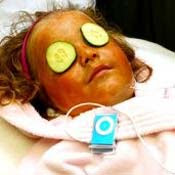How to counter “Too Much, Too Soon, Too Sleazy” ads aimed at our daughters and raise healthier girls from the inside out
Thongs undies for toddlers.
Push-up bras for eight-year olds.
Sneakers to “tone” legs for preschoolers.
Marketers keep pushing that “too sexy, too soon” envelope on our young daughters, and we are seeing impact on our daughters’ self-esteem and body images.
Keep in mind that it isn’t just one advertisement or one commercial that affects a young girl’s self-concept, but the constant slew of images pushing a “too fast, too soon” look. And that’s exactly what our girls are exposed to these days. The “constant” seeing or hearing over-sexualized messages can be damaging to a young girl’s mental, emotional or moral well being.
The extent of that damage depends upon each particular girl, but we do know younger girls (especially those seven to twelve years old) and those with lower self-esteem are more vulnerable. But let’s be clear: these over “too much, too soon” messages are not healthy for any girl’s self-image or body image, and it’s why we should be concerned about the onslaught of these sexualized messages on our daughters. They are having a negative impact. Here are a few dangers, and why we should be outraged.
1. Pushes a Wrong Message on How to Achieve Happiness

Children’s self-beliefs, values, and attitudes are formed through repetition. Continual messages that stress “thin, looks, tone, sexy” can cause girls to believe that they should be pushing their childhoods ahead. For instance, a young girl can translate those messages as:
“I should be acting and dressing like a teen even though I’m in grade school.”
“I should be dieting.”
“I should be wearing makeup.”
“I should be worried about if my legs are toned.”
“I should be ….”
The problem is her “should bes” are unrealistic, unhealthy, and damaging. Is there any wonder why 80 percent of fourth grade girls worry they will be fat? This morning my local newspaper contained this interesting fact….and I quote: “One study found that 80 percent of all U.S. women admit to being dissatisfied with their figures.” Concerns about our “shoulds” don’t seem to improve with age.
2. Develops a “Flimsy” Self-image that Endangers the Development of Resilience

Authentic self-esteem is a fine balance between a “feeling of worthiness” and a “feeling of capableness.” Developing both of those essential feelings is what helps our daughters handle stress, cope with life, and bounce back when the going gets tough. And those crucial school years are when our daughters are doing serious work in shaping their self-concepts and forming their “Who I am?” opinions about themselves.
Messages over-loaded with looks, appearance, weight, dress size, and toned legs (all addressing the “Am I worthy?” side of the self-esteem quotient) don’t allow girls to develop positive images for their “feeling capable sides.” Too much emphasis on looks can also cause girls to miss out on those crucial opportunities that help them figure out their strengths, interests, likes, hobbies, values, etc. A flimsier self-esteem is also likely to mean a girl has a weaker “Resilience Quotient” (that crucial commodity she’ll need to handle life) due to an unbalanced acquisition of self-esteem.
3. Decompressed Childhood
“Too fast, too soon” messages push girls to grow up too quickly for their age and maturity. Growing up “before their time” also means missing out on developmentally appropriate activities, rituals, and games that are such an integral part of growing up. Instead of playing, discovering, learning, creating, relishing, or just being, they are devoting priceless energy wondering how they should look or weigh or act. There is no rewind button on childhood, folks.
4. Boosts Health Risks
Do you know the new hot “Sweet 16” birthday gift request? It’s Botox! (Yep, Botox… I still haven’t quite figured that one out or found a sixteen year old girl with a wrinkle). Breast implants are now on our girls’ high school graduation “wish lists.” According to the American Society for Aesthetic Plastic Surgery, more than 36,800 cosmetic surgery procedures were performed last year on girls eighteen and under. There is always a risk with surgery, but what about the risk to a young girl’s body image? And why?
5. Increases Mental Health Risks
Research also shows that the proliferation of sexualized images in advertising, merchandising and media are indeed harmful to a young girls’ self-image and health. A five-year study of 2516 teens by the American Psychological Association found that girls who frequently read those dieting and weight loss articles are far more likely to fast, vomit, or use laxatives to lose weight. In fact, the data found that the more frequently a girl sees those over-sexualized, images, the more likely she is to resort to extreme weight control behaviors.I don’t think it’s a mere coincidence that we’re also seeing a tragic increase of eating disorders in girls who are seven and eight years of age.
6. Increases Odds for Risky Behaviors
Those “too fast, too soon” images can also push our girls into those “teen” years sooner. (From the looks of things eight has become the new 13). Growing up faster also means the potential for earlier drinking, earlier promiscuity, earlier peer pressure-and those all add up to taking more unhealthy risks.
There are dangers on all those too sexy, too much, too soon negative images on our girls’ physical, mental, emotional and moral development. So how do we counter those negative media images and raise healthier daughters? Here are a few ideas.
Countering Negative Media Images To Raise Girls from the Inside Out
“Up” Your Outrage!

These products are sold because they are purchased. A collective parental “NO!” would send a clear message to advertisers. Write your concerns to distributors and product developers. Those complaints do work…several of these companies have reconfigured their advertisements and even removed them from their websites. “Outrage” petitions are also gaining signatures by the minute. Speak out and keep your wallets shut. Also, share your concerns to your daughter to help develop her media literacy.
Check Your Attitude
Kids who see and hear their parents (especially moms) worrying about their appearance usually adopt the belief that “being young and thin” is the standard to achieve. So watch your comments (please!!) and tune into your own behavior. Your daughter is watching and listening more than you may realize! And you are also far more influential on her development than you may be giving yourself credit for.
Build Self-Esteem from the Inside Out

A positive, authentic, well-rounded sense of self-esteem and healthy body image are essential for our girls. So find ways to help your daughter gain competence in physical, social and academic endeavors. Help her realize her innate strengths and wonderful personal qualities. Focus your praise on her deserved inside qualities-a kind-heart, optimistic spirit, stick-to-it attitude-so she realizes “who I am is more important than how toned my legs are or what I look like.”
Watch Her Media Diet, Please!
Control your remote, get her a subscription to healthy magazines, and find her healthy outlooks that don’t require wearing sexy attire. And while you’re at it, put down those celebrity magazines…at least when your daughter is in the room!
Check her Friends
Tune in a bit closer to what your daughter’s friends are talking about. If the focus is all about the latest “diets” and “dress size” it may be time to steer your child toward others friends with healthier outlooks.

Find Like-Minded Parents
Consider talking with parents of your teen’s friends and hear their views. Chances are they share your standards. Standing together will reduce those, “You’re the only parent who feels that way.” I’m betting you’re not. Find parents who share your values and join forces so you can stop this craze together.
Find Positive Role Models
Tune into those so-called role models. Make sure their examples are ones you want your daughter to copy. Let’s offer our daughters female role models who feel comfortable in their own skin and don’t need to rely on Botox, breast implants, dieting, and designer labels to feel attractive. Expose your daughter to authentic, confident women, and then tell her why you admire them. Our girls need strong, resourceful female examples to emulate.
Our best hope is to help our daughters learn—and as early as possible—that real happiness isn’t borrowed or copied, but lies within. That’s exactly why we need to help our girls become strong from the inside out. Doing so is what will help our daughters feel comfortable in their own skin.
Enough!
Dr. Michele Borba, Parenting Expert
I am an educational psychologist, parenting expert, TODAY show contributor and author of 22 books. You can also refer to my daily blog, Dr. Borba’s Reality Check for ongoing parenting solutions and late-breaking news about child development.
Follow me on twitter @MicheleBorba
You can also find dozens more research-based and practical tips for 101 other parenting challenges and worries inThe Big Book of Parenting Solutions.

